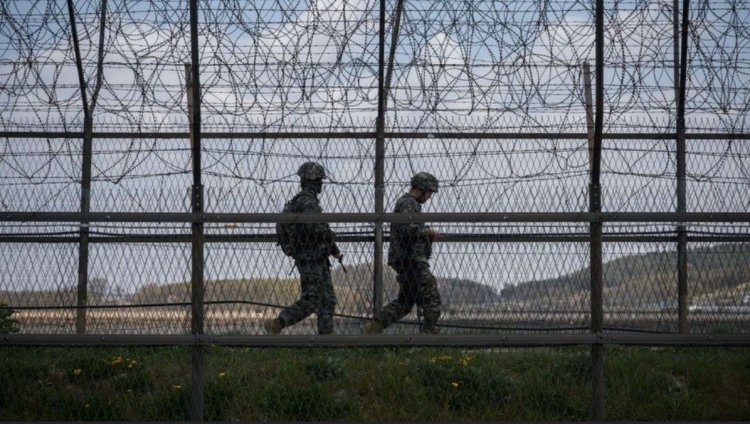North Korea restricting and violating the right to freedom of movement

11-02-2024
Pauliina Majasaari
Human Rights Researcher
Global Human Rights Defence
The government of The Democratic People’s Republic of Korea (North Korea) is violating the right to freedom of movement by law, according to which, moving within or leaving the territory without prior approval by the government leads to a crime of treachery against the nation which is punished, amongst others, by imprisonment, forced labour and/or execution.[i]
The aforementioned legislation has been in force since 2010, with a gruesome ‘shoot on sight’ order.[ii] The aim is to punish those who flee the country as they are regarded as defectors as well as tighten the control of the movement of the persons residing in North Korea.[iii] Moreover, after the breakout of Covid-19, the government has reinforced and increased the scrutiny of the existing rules on international travel and internal movement within the territory, with no intentions to ease the tightened rules brough by Covid-19.[iv]
The International Covenant on Civil and Political Rights (ICCPR), under Article 12, sets out the right to freedom of movement for all individuals, including free movement within the territory of the state, the right to leave the state as well as the freedom to choose the place of residence.[v] However, the North Korean government is not abiding by this rule for the following reasons. Firstly, the individuals residing in North Korea are not allowed to choose their place of residence, as groups of individuals have been forcibly displaced to other regions of the country on behalf of the government.[vi] Secondly, internal travel is monitored very closely through the use of security checkpoints on entry and exit points of town roads as well as the presence of the limited right to use vehicles to move around the country.[vii] Thirdly, foreign travel is accessible to only a limited elite, such as diplomats, businesspersons, academics and athletes.[viii] Even though the restriction on the right to freedom of movement is based on legislation, it cannot be justified to be necessary to protect national security, public health or morals and - order and therefore a violation of the said human rights provision is present.
As indicated and argued by the international community, the practice taking place in North Korea is violating Article 12 of the ICCPR.[ix] For the commitments and obligations set on North Korea under international legislation, and as brought to the attention by other international actors as well, it is necessary to highlight the urgent need for North Korea to amend its existing legislation and therefore abide by the governing international legislation for being a State Party to the present Covenant.[x]
[i] Tirana Hassan, ‘North Korea: Events of 2022’ (Human Rights Watch, 2023) <https://www.hrw.org/world-report/2023/country-chapters/north-korea> accessed February 9th 2024.
[ii] Phil Robertson, ‘South Korea: Act to Save North Korea Refugees’ (Human Rights Watch, November 24th 2015) <https://www.hrw.org/news/2015/11/24/south-korea-act-save-north-korea-refugees> accessed February 11th 2024.
[iii] U.S. Department of State,’2017 Country Reports on Human Rights Practices: Democratic People’s Republic of Korea: Freedom of Movement and the Right to Leave the Country’ (U.S. Department of State, 2017) <https://www.state.gov/reports/2017-country-reports-on-human-rights-practices/democratic-peoples-republic-of-korea/> accessed February 11th 2024.
[iv] Human Rights Watch, ‘North Korea: Covid-19 Still Used to Justify Repression: Heightened Oppression Worsens Humanitarian Crisis’ (Human Rights Watch, January 11th 2024) <https://www.hrw.org/news/2024/01/11/north-korea-covid-19-still-used-justify-repression> accessed February 11th 2024.
[v] International Covenant on Civil and Political Rights (adopted 16 December 1966, entered into force 23 March 1976) 999 UNTS 171 (ICCPR).
[vi] U.S. Department of State,’2017 Country Reports on Human Rights Practices: Democratic People’s Republic of Korea: Freedom of Movement and the Right to Leave the Country’ (U.S. Department of State, 2017) <https://www.state.gov/reports/2017-country-reports-on-human-rights-practices/democratic-peoples-republic-of-korea/> accessed February 11th 2024.
[vii] ibid.
[viii] ibid.
[ix] United Nations Human Rights Office of the High Commissioner, ‘The price is rights: The violation of the right to adequate standard of living in the Democratic People’s Republic of Korea’ (United Nations, 2019) <https://www.ohchr.org/sites/default/files/Documents/Countries/KP/ThePriceIsRights_EN.pdf> accessed February 13th 2024.
[x] Centre for North Korean human Rights Records, ‘2023 Report on North Korean Human Rights’(The Ministry of Unification, April 2023) <https://www.unikorea.go.kr/eng_unikorea/news/Publications/ronkhr/> accessed February 13th 2024.




 GHRTV
GHRTV 




























